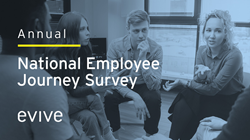
Evive’s releases key findings from its annual National Employee Journey Study
As the hybrid workplace reshapes work, employers will need to identify new ways to align their strategy, culture and talent to ensure everyone is working toward achieving common goals and driving business success.
CHICAGO (PRWEB)
January 25, 2022
Ninety-four percent of U.S. employers felt they were doing a good job of communicating with employees. Yet, only 61% of employees agreed, according to a new study released today from Evive, the leader in digital engagement and communication technology.
Evive’s annual National Employee Journey Survey included a representative sample of 1,000 responses, including 500 full-time employees and 500 human resource representatives and senior leaders across many industries and positions in the U.S. The survey offers employers key insights and a critical reality check on perception versus reality regarding employee engagement throughout the employee journey.
According to the study, there is a deep divide when it comes to whether employers truly care about their employee’s well-being. Ninety-three percent of employers felt their company prioritized employee well-being compared to 60% of employees. The truth lies in the data. More than 17% of employees reported stress every day and more than 33% felt stress every week.
“The disconnect between employers and employees in the workplace provides unprecedented opportunities to create meaningful, lasting change,” said Prashant Srivastava, founder and CEO of Evive. “When employees feel heard and respected, you empower them to deeply engage with your company and its culture. They feel a strong sense of pride and belonging, improving job satisfaction and employee retention, especially important during this period of historic turnover.”
Key findings that highlight the differences between employees and employers as well as opportunities to improve the work environment for better health and increased productivity include:
Onboarding:
Ninety-six percent of employers were satisfied with their onboarding process, while only 70% of employees felt the same way. Similarly, only 45% of employees felt their employer provided a personalized onboarding experience but that number rises to 85% when you ask employers.
With 4.2 million employees quitting their jobs in October, personalized onboarding is critical to fill vacant roles as the Great Resignation continues. Personalizing the experience by delivering relevant and useable resources to the right person at the right time on the right device shows new employees the company understands their needs, building trust and establishing a strong relationship from the start.
Career Development:
Ninety-five percent of employers said their company provides resources and opportunities for employees to develop professionally and advance their careers, but that number falls among employees to 66%, including 58% of baby boomers, 64% of Generation X, 74% of millennials and 50% of Generation Z.
While resources might be available, are they promoted and shared with employees? Personalize the opportunity by letting departments know about available skill-growth and career resources to support employee development and growth as well as increase participation and utilization of these resources.
Learning to Lead:
Ninety-three percent of employers felt their organization provided the right amount of training for new leaders compared to 49% of employees.
The transition from individual contributor to team manager is never seamless. Surveys are ideal for identifying and measuring leadership potential in employees. Then use personalized LMS resources to support manager development and growth.
Healthy Household:
Employees would find it helpful if employers sent health screening reminders (61%) for themselves and their spouse (51%). More than 72% would like personalized recommendations on what health plan to pick.
Employee benefits are often underutilized because employees are unaware of the benefits or don’t understand how to use them. Personalizing benefits communications improve utilization and engagement and help guide employees on what benefits to use at the right time, saving time, money and increasing well-being.
Succeeding Financially:
Only 15% of employees said their organization offered financial planning benefits, yet this benefit ranked as the third most desired (25%), behind a four-day workweek (56%) and flexible hours (34%). Other financial benefits employees want to see include student loan assistance (24%) and pet insurance (23%).
Employee financial wellness benefits are now a requirement. Employers must support employees by offering financial benefits that help employees reduce financial stress, live better lives and maximize financial opportunities.
Offboarding:
While nearly 87% of employers felt their employees would be good future advocates for the company, only 43% of employees agreed.
Maximize offboarding by personalizing the process to thank departing employees for their contributions. Strategic offboarding aids in employee advocacy, creates a network of alumni advocates to provide future referrals and welcomes back boomerang employees.
“As the hybrid workplace reshapes work, employers will need to identify new ways to align their strategy, culture and talent to ensure everyone is working toward achieving common goals and driving business success,” said Srivastava. “By creating and sustaining alignment across the employee journey, organizations can increase revenue, improve staff performance and gain a competitive advantage.”
Are you interested in exploring the data further? Visit here to download an executive summary of the study.
Share article on social media or email:

